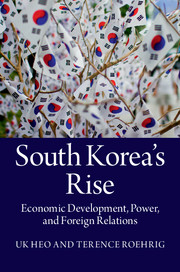Book contents
- Frontmatter
- Dedication
- Contents
- List of figures
- List of tables
- Acknowledgements
- 1 Introduction
- 2 Economic development, state power, and foreign policy
- 3 Inter-Korean relations: confrontation, economic exchanges, and the nuclear crisis
- 4 South Korea and the United States: from dependency to partnership
- 5 South Korea, Russia, and China: from adversaries to economic partners
- 6 South Korea and Japan: an ambivalent relationship
- 7 South Korea and the European Union: evolving cooperation and competition
- 8 South Korea and India: opportunities and obstacles
- 9 South Korea and the developing world: Africa, Latin America, the Middle East, and Southeast Asia
- 10 Contributing to the international community: from consumer to producer
- 11 Conclusion
- Bibliography
- Index
- References
2 - Economic development, state power, and foreign policy
Published online by Cambridge University Press: 05 July 2014
- Frontmatter
- Dedication
- Contents
- List of figures
- List of tables
- Acknowledgements
- 1 Introduction
- 2 Economic development, state power, and foreign policy
- 3 Inter-Korean relations: confrontation, economic exchanges, and the nuclear crisis
- 4 South Korea and the United States: from dependency to partnership
- 5 South Korea, Russia, and China: from adversaries to economic partners
- 6 South Korea and Japan: an ambivalent relationship
- 7 South Korea and the European Union: evolving cooperation and competition
- 8 South Korea and India: opportunities and obstacles
- 9 South Korea and the developing world: Africa, Latin America, the Middle East, and Southeast Asia
- 10 Contributing to the international community: from consumer to producer
- 11 Conclusion
- Bibliography
- Index
- References
Summary
In this book we seek to develop a theory that explains how economic development affects a state’s power and foreign policy in international relations. We begin here by laying out that theory with a description of the potential changes that come to foreign policy as states develop their economies. Next, this chapter places the theory in the context of previous literature on economic development, political modernization, democratization, and foreign policy. While we use South Korea as a case study to examine the theoretical implications of the nexus between economic development and foreign policy change, this study is also applicable to other rising economic powers.
A theory of economic development and foreign policy change
Economic development can influence a country’s foreign policy behavior in a number of ways because as a nation develops its economy, changes in domestic politics occur and citizens expect more from the government. Economic development often leads to the transition to democracy, which occurs through a number of channels, including better education, industrialization, and a growing middle class. Democratization brings in elite changes. The new elites may interpret national interests differently, and make policy changes, such as shifting the focus in foreign policy, and changing relations with other states may follow, reflecting the new assessment of national interests. Thus, the transformation of political elites and type of government often leads to changes in a country’s foreign policy and international relations.
- Type
- Chapter
- Information
- South Korea's RiseEconomic Development, Power, and Foreign Relations, pp. 10 - 27Publisher: Cambridge University PressPrint publication year: 2014



